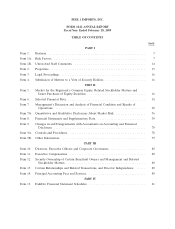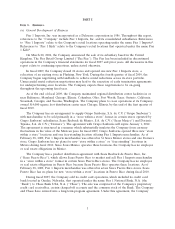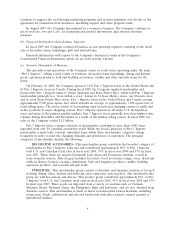Pier 1 2009 Annual Report Download - page 19
Download and view the complete annual report
Please find page 19 of the 2009 Pier 1 annual report below. You can navigate through the pages in the report by either clicking on the pages listed below, or by using the keyword search tool below to find specific information within the annual report.the dollar and other currencies, duties, taxes and other charges on imports, dock strikes, import quota
systems and other restrictions sometimes placed on foreign trade can affect the price, delivery and
availability of imported merchandise as well as exports to the Company’s stores in other countries. The
inability to import merchandise from China and other countries, unavailability of adequate shipping
capacity at reasonable rates, or the imposition of significant tariffs could have a material adverse effect
on the results of operations of the Company. Freight costs contribute a substantial amount to the cost
of imported merchandise. Monitoring of foreign vendors’ compliance with U.S. laws and Company
standards, including quality and safety standards, is more difficult than monitoring of domestic vendors.
The United States government has the authority to enforce trade agreements, resolve trade
disputes, and open foreign markets to U.S. goods and services. The United States government may also
impose trade sanctions on foreign countries that are deemed to violate trade agreements or maintain
laws or practices that are unjustifiable and restrict U.S. commerce. In these situations, the United
States government may increase duties on imports into the United States from one or more foreign
countries. In this event, the Company could be adversely affected by the imposition of trade sanctions.
In addition, the United States maintains in effect a variety of additional international trade laws
under which the Company’s ability to import may be affected from time to time, including, but not
limited to, the antidumping law, the countervailing duty law, the safeguards law, and laws designed to
protect intellectual property rights. Although the Company may not be directly involved in a particular
trade dispute under any of these laws, its ability to import, or the terms and conditions under which it
can continue to import, may be affected by the outcome of such disputes.
In particular, because the Company imports merchandise from countries around the world, the
Company may be affected from time to time by antidumping petitions filed with the United States
Commerce Department and International Trade Commission by U.S. producers of competing products
alleging that foreign manufacturers are selling their own products at prices in the United States that
are less than the prices that they charge in their home country market or in third country markets or at
less than their cost of production. Such petitions, if successful, could significantly increase the United
States import duties on those products. In that event, the Company might possibly decide to pay the
increased duties, thereby possibly increasing the Company’s price to consumers. Alternatively, the
Company might decide to source the product or a similar product from a different country not subject
to increased duties or else discontinue the importation and sale of the product.
In recent years, dispute resolution processes have been utilized to resolve disputes regarding
market access between the European Union, China, the United States and other countries. In some
instances, these trade disputes can lead to threats by countries of sanctions against each other, which
can include import prohibitions and increased duty rates on imported items. The Company considers
any agreement that reduces tariff and non-tariff barriers in international trade to be beneficial to its
business. Any type of sanction on imports is likely to increase the Company’s import costs or limit the
availability of merchandise purchased from sanctioned countries. In that case, the Company may be
required to seek similar merchandise from other countries.
Risks Relating to Liquidity
The disruption in the global credit and equity markets could adversely impact the Company’s ability to
obtain financing on acceptable terms or could increase the cost of obtaining credit.
From fiscal 2006 through fiscal 2009, the Company has incurred net losses and had negative cash
flows from operations. In the future, the Company may become dependent on the availability of
adequate capital to fund its operations, carry out its turnaround strategy, or refinance existing
indebtedness if necessary. Disruption in the global credit and equity markets and future disruptions in
the financial markets could adversely affect the Company’s ability to enter into new financing
agreements, refinance the Company’s current indebtedness if necessary, or obtain funding through the
12
























